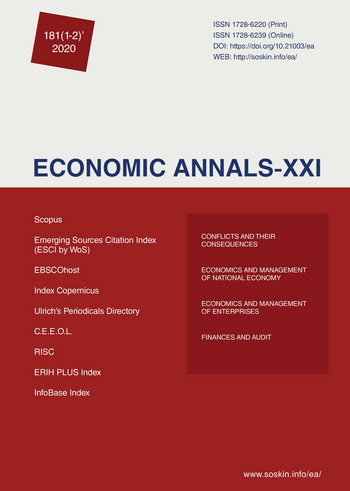Taxation, economic growth and welfare in a low-income country
Taxation, economic growth and welfare in a low-income country
Author(s): Andriy Krysovatyy, Viktor Fedosov, Olena Tymchenko, Maryna SilchenkoSubject(s): Economy, Economic policy, Economic development, Public Finances, Fiscal Politics / Budgeting
Published by: Institute of Society Transformation
Keywords: Tax; Tax Policy; Tax Burden; Economic Growth; Well-Being; VAT; VAT on Medicines; Ukraine; Low-Income Country;
Summary/Abstract: Tax policy should promote not only economic growth but also the well-being of citizens. Otherwise, the problem of economic growth will arise again. This issue is relevant for many low-income countries. The governments of such countries can achieve some GDP growth and stabilize public finances. However, if such growth is accompanied by impoverishment of the population that is unable to meet the corresponding consumer demand, it leads to GDP fall and lack of financial resources. We seek to find out how the tax burden and tax structure affect economic growth and welfare in Ukraine taking into account international experience. For this purpose, we analyze the correlation between the tax burden and GDP and based on the method of chain substitutions reveal the impact of the compensation of employees (salaries), taxes and gross surplus on GDP growth and confirm our main hypothesis that the tax burden increase does not lead to GDP reduction in Ukraine. There is a direct connection between the tax burden and GDP in Ukraine. The GDP decreases with a lowering in the tax burden and, accordingly, grows with its increase. Such correlation complicates the decision-making on further improvement of the tax system of Ukraine to realize the purpose of sustainable economic grows. On the one hand, in comparison with other countries the tax burden in Ukraine is not much higher, but it is criticized by the business. On the other hand, the Ukrainian Government has a permanent problem which is a lack of necessary resources for funding public expenditures. Therefore, when making decisions, the impact of certain types of taxes and changes in the tax structure should be taken into account. The study showed that the corporate income tax rates reduction had a positive effect on investment dynamics, and excise taxes increase has led to the reduction of legal production and increase of shadow sector. VAT (20%) has a neutral effect on GDP growth in Ukraine, while the introduction of 7% VAT on medicines has led to an increase in prices and changed the structure of consumption towards the low-priced goods. The changes (increase) in personal income taxation have reduced consumer demand and hampered GDP growth and welfare.The authors give the recommendations regarding changes in the tax policy of Ukraine based at own empirical findings and with regard to the current institutional peculiarities of Ukraine.
Journal: Економічний часопис - ХХІ
- Issue Year: 181/2020
- Issue No: 01+02
- Page Range: 44-56
- Page Count: 13
- Language: English

